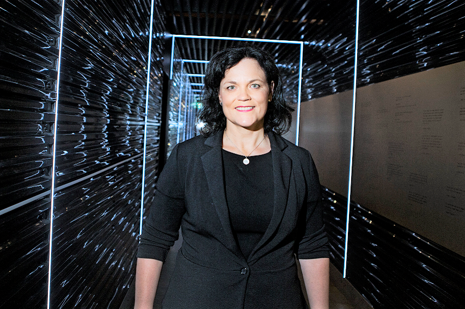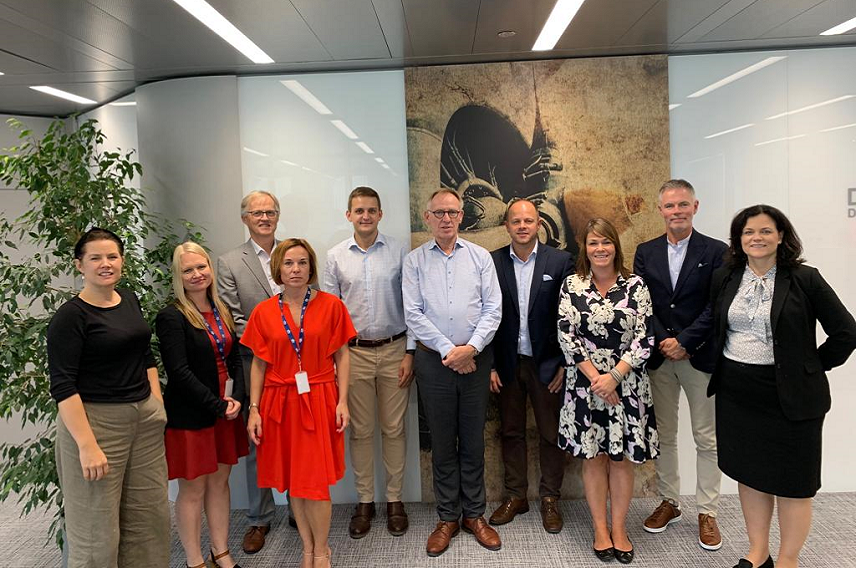
A Swedish national with an extensive experience in government and aerospace, Catrin Mattsson will lead IATA's Nordic & Baltic office based in Stockholm, Sweden.
We met with Catrin during her introductory visit to IATA's Europe Region office in Madrid, Spain where she kindly took some time in her already extremely busy schedule to answer a few questions on a wide array of topics ranging from her past experience, her stance on sustainability to what she foresees for the Nordic & Baltic in the short and long terms.
Catrin, welcome aboard! Tell us a bit more about your professional background and what you will bring to IATA from your previous experience?
My professional background includes holding senior positions in both government and the Aerospace Industries in Sweden. I will now focus on hitting the ground running in my new position at IATA where new perspectives, organizational issues and learning acronyms are among the first challenges I will face!
Thanks to my prior experiences, one of the strongest assets I will bring to this new Area Manager position is the ability to lead solid advocacy efforts through communication and collaboration between the public and private sector. This is something I consider to be crucial in promoting our agenda in the Nordic & Baltic countries. I truly value cooperation, a key for success, and look forward to partnering with IATA colleagues from across our various offices to ensure aviation continues delivering benefits to the region.
Having worked on the other side of the business (government), what are your expectations?
Increasing mutual understanding between the industry and governments is crucial. To be relevant, we need to understand the political agenda and the political organization to address our industry's issues in the right way, at the right time and with the right people.
You are starting your new position at a very interesting time for the industry, with growth and sustainability at the top of the agenda. What do you plan to do in your Nordic & Baltic cluster with regards to these two priorities?
It is indeed an exciting time. Sustainability is really at the top of the public and political agenda in our region. We must ensure that we are relevant in that debate, and in partnering with the industry, other relevant stakeholders and governments to promote the development of policies, methods, technologies, services, solutions and fuels that can reduce the greenhouse gas footprint, all the while enabling the industry to grow… in a sustainable manner.
The debate on flying more responsibly or even not flying at all with the flygskam (flight shaming) movement that originated in your cluster is now spreading among the general public. What do you think the industry should do to address this particular concern?
We need to go after the emissions, not the passengers.
Unfortunately, the perception on flying has, at least in our region, become associated to global warming. Since that image is highly unbalanced, many people tend to believe that emissions from the airline industry are much higher than what they are in reality. Therefore, providing a factual, accurate, and basically full picture of the airline industry with its actions and commitments to governments and the general public is essential. As is complementing this with a variety of concrete actions designed to make the industry more sustainable, more eco-efficient and to reduce our overall environmental footprint. Last but not least, to solve this unbalanced vision of aviation, we also need to highlight and promote all the values and positive impact that aviation brings.
With Nordic & Baltic at the avant-garde of environment protection, what lessons can be learned for other parts of our vast and diverse European Region?
Sustainability is increasingly moving up on the agenda in many countries across Europe. I think it is wise to address this topic and related subtopics as early as possible. We need to enhance aviation's visibility in the media and become more pro-active by proposing actions to boost sustainability and competitiveness.
One of the main advantages of IATA's truly global DNA and worldwide presence resides in the opportunity to share best practices from different areas and regions. The Nordic & Baltic team is always open to exchanging ideas, knowledge and experience with others, regardless of their location. This approach could serve as a positive solution to address an issue such as sustainability. The latter will inevitably top the list of priorities in places where, for various reasons, it is not yet among an area of concern.
How do you see the Nordic & Baltic market evolving in the coming years?
The last year has been a bit shaky. Several airlines are certainly experiencing an increase in pressure and potentially a decrease in traffic. It might still be early to draw some conclusions and further analysis is needed, but several aspects need to be considered such as flight shaming, currency differences, fiscal issues, business conditions and the overall economy including trade wars.
Predicting the future is difficult, but I see potential for growth. The Nordic & Baltic market has the opportunity to lead the way in addressing aviation sustainability, something that might be regarded as a competitive strength in the not so distant future.

Catrin Mattsson (right) hosts her first meeting at IATA’s Europe Region office in Madrid, welcoming a Nordic delegation comprising colleagues from Finnair, Icelandair, the Confederation of Danish Industry and the Federation of Norwegian Aviation Industries to discuss the key air transport issues in the region (particularly environment), align industry positions and agree on joint actions.